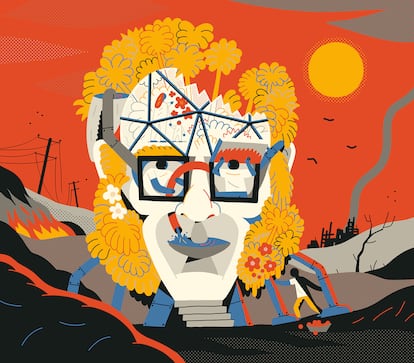Seven keys to being more human in the times of AI: The art of living according to Asimov
The life story of one of the most famous science fiction authors in the world offers useful lessons for uncertain times

In his novels and stories, Isaac Asimov anticipated many of the situations we are experiencing today. However, beyond his achievements in science fiction and dissemination, from this visionary’s work we can obtain very human lessons for our daily lives, in a world that increasingly resembles that of his books.
The only way to change an adverse fate is to rebel against it. Isaac Asimov emigrated from Russia to New York when he was 3. His status as a foreigner and a Jew, with parents who ran a candy store without speaking English, seemed to condemn him to low-ranking jobs. Ridiculed and ignored by his classmates, he set out to outdo them all: when the others played, he read and educated himself. He became a bookworm and the best student in his school.
No matter how good you are, others will always surpass you. After his first success at school, in high school he was no longer the best; he was one of the 10 most outstanding students. Later, in college, he became just one more student. This gave him humility, as well as the ability to admire and learn from authors he considered better than himself. Only when you understand that you have been surpassed can you outdo yourself.
You learn more from losing than from winning. Asimov tells an anecdote about the only time he put aside his aversion to gambling to join a poker game with some college mates after being assured that the stakes would be very low. When he confessed to his father what he had done, he asked him: “How did you do?” Young Isaac replied: “I lost fifteen cents.” His father, aware of the addictive qualities of gambling, remarked: “Thank God. Think if you had won fifteen cents.”
Friends are the crew that will help you reach other worlds. After a lonely childhood and adolescence, his life changed radically when he joined the Futurians, a group of science fiction fans, some of whom went on to become renowned writers. This group supported and empowered him to write and publish his first short stories in specialized magazines. In addition, finding like-minded people made him an outgoing man who, in his own words, when he was allowed to lead the conversation, didn’t let anyone be shy. He would remain in touch with these friends until his death in 1992.
Help those who are less fortunate or talented than you. After the early encouragement he received from aspiring writers like himself, Asimov was well aware that his achievements had placed him in a position of privilege. For this reason, whenever he received letters from friends in need, he would send them small amounts of money so they could get by. In addition to obtaining a good income from his works — he would publish more than 500 books — Asimov attributed his good financial health to the fact that he did not gamble, smoke or drink. If you have no vices, he believed, there will always be money in your pocket.
A person is only as good as the use they make of their time. To help his parents, Asimov alternated his studies with long hours working in the family business, a schedule he would keep all his life. “I wake up at five in the morning. I get to work as early as I can. I work as long as I can. I do this every day in the week, including holidays,” he explains in his memoir. “In other words, I am still and forever in the candy store.” He squeezed the hours to do the things he liked the most; thus, it was not a sacrifice. For him, it was “overflowing happiness.”
No journey is more enjoyable than reading. The author of I, Asimov, says: “If I want to recall peace, serenity, pleasure, I think of myself on those lazy summer afternoons, with my chair tipped back against the wall, the book on my lap, and the pages softly turning.” Despite all the honors received throughout his life, which compelled him to travel often and meet great personalities, he always associated “quiet, peaceful happiness” with the act of reading. The man who made us dream of prodigious intergalactic ships knew that there is no more powerful vehicle than a book that comes to life thanks to the human mind.
Sign up for our weekly newsletter to get more English-language news coverage from EL PAÍS USA Edition
Tu suscripción se está usando en otro dispositivo
¿Quieres añadir otro usuario a tu suscripción?
Si continúas leyendo en este dispositivo, no se podrá leer en el otro.
FlechaTu suscripción se está usando en otro dispositivo y solo puedes acceder a EL PAÍS desde un dispositivo a la vez.
Si quieres compartir tu cuenta, cambia tu suscripción a la modalidad Premium, así podrás añadir otro usuario. Cada uno accederá con su propia cuenta de email, lo que os permitirá personalizar vuestra experiencia en EL PAÍS.
¿Tienes una suscripción de empresa? Accede aquí para contratar más cuentas.
En el caso de no saber quién está usando tu cuenta, te recomendamos cambiar tu contraseña aquí.
Si decides continuar compartiendo tu cuenta, este mensaje se mostrará en tu dispositivo y en el de la otra persona que está usando tu cuenta de forma indefinida, afectando a tu experiencia de lectura. Puedes consultar aquí los términos y condiciones de la suscripción digital.








































